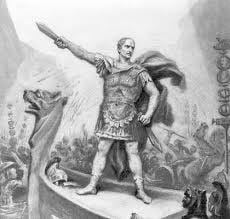Julius Caesar got himself captured by pirates and held for ransom when he was twenty-five. Before you feel sorry for him, keep in mind that this was a fairly common practice at the time (75 BCE). They asked for a ransom of 20 talents of silver (about $600,000 in today’s value).
Caesar said, essentially, “don’t you know who I AM?” Even at a young age, with all his conquests ahead of him, Julius was still part of a large and wealthy family and had supporters who would pay to get him back. (If you had yourself an ancient pirate band, kidnapping was far more lucrative than plunder). So Caesar demanded they double the ransom.
The pirates were onboard with the new number, and Caesar sent some of his people to raise the money, which took about a month and a half. In the meantime, he lived with the pirates as a debased and humiliated captive.
Not really. This was Julius Caesar, after all. He demanded they be quiet when he was trying to sleep, made them listen to his amateur poetry, and joined in their games and exercises. He won their respect and he was able to move about their ships and their island base with relative freedom.
Toward the end of his captivity, and possibly in response to an unenthusiastic reception for his latest poem, Caesar told the pirates that once he was free he would come back and crucify them all. This got a pretty big laugh; despite his pretensions of grandeur, Julius Caesar was, at the time, just some little rich kid who ended up on the wrong boat.
The ransom was paid and Caesar went off, raised a fleet, came back to the pirate base, captured his former pals, and took back the ransom. He imprisoned them and went to see the local proconsul to demand that they be executed. The proconsul wanted to sell the pirates into slavery and keep the money for himself (this was one of the reasons being proconsul was such a great gig in ancient times).
Caesar went back to where the pirates were being held and had them crucified. He cut their throats first as an act of mercy because, after all, they were buddies.
Even if they didn’t like his poetry.




